our response to the company law review completing the structure
- 格式:pdf
- 大小:43.78 KB
- 文档页数:13

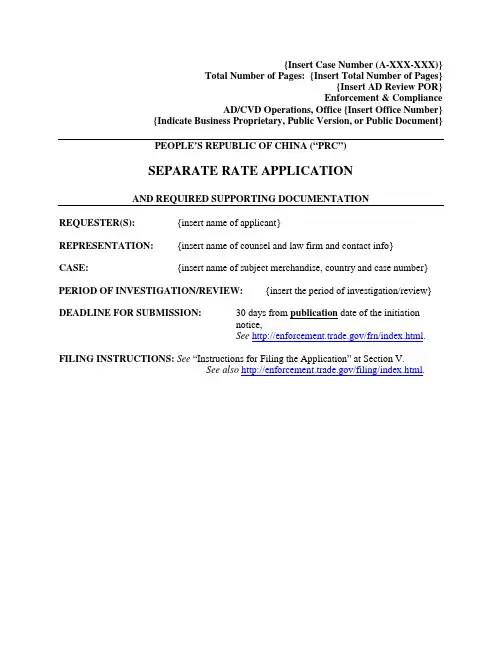
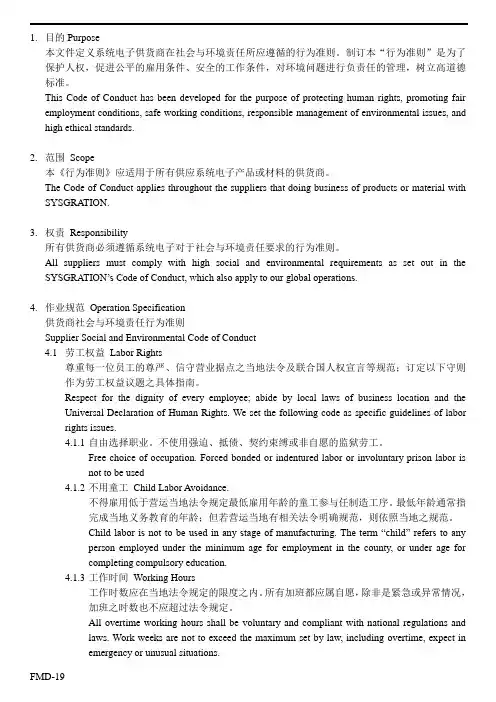
1.目的Purpose本文件定义系统电子供货商在社会与环境责任所应遵循的行为准则。
制订本“行为准则”是为了保护人权,促进公平的雇用条件、安全的工作条件,对环境问题进行负责任的管理,树立高道德标准。
This Code of Conduct has been developed for the purpose of protecting human rights, promoting fair employment conditions, safe working conditions, responsible management of environmental issues, and high ethical standards.2.范围Scope本《行为准则》应适用于所有供应系统电子产品或材料的供货商。
The Code of Conduct applies throughout the suppliers that doing business of products or material with SYSGRATION.3.权责Responsibility所有供货商必须遵循系统电子对于社会与环境责任要求的行为准则。
All suppliers must comply with high social and environmental requirements as set out in the SYSGRATION’s Code of Conduct, which also apply to our global operations.4.作业规范Operation Specification供货商社会与环境责任行为准则Supplier Social and Environmental Code of Conduct4.1劳工权益Labor Rights尊重每一位员工的尊严、信守营业据点之当地法令及联合国人权宣言等规范;订定以下守则作为劳工权益议题之具体指南。

Dear Reviewers:I want to express my very deep appreciation,and the appreciation of all of us,to the referees great efforts and suggestions for our manuscript.They are valuable and very helpful for revising and improving our paper,as well as the important guiding to our researches.----------------------------------------------------------------------------------------------------------------------The following is a point-to-point response to the reviewers’comments and responses are in black. The modification marked in red in revised version.------------------------------Responses to Reviewer#2Review Comments:In this paper,the authors propose an extended state observer based dual-loop controller to control rigid spacecraft attitude with consideration of inertia uncertainties, assigned velocity and control constraints through sliding mode algorithm.This problem is interesting.However,there are some doubts and typos in this present paper as follows:[1]In Sections1and3,the authors say“external state observer”should be“extended state observer”,please check and revise it.Response:The phrase"external state observer"has been changed to"extended state observer"in our revised paper.[2]In Eq.(1),what does the⨯ωstand for?Response:The operator⨯ωand⨯q denote the skew-symmetric matrices,which is given in equation(3).[3]According to Eqs.(5)and(10),there exist some mistakes in the Fig.1,please double check it. Response:Thanks for your suggestion;we have corrected the mistake in the Fig.1.[4]After Eq.(10),the authors say“…the estimation of angular velocityωδ…”,which is unreasonable description based on Eq.(5).Response:Right you are!We have taken your advice,the phrase"…the estimation of angular velocityωδ…"has been changed to"…the estimation of angular velocity errorωδ…"in our revised paper.[5]In the Abstract,the authors say that the dual-loop controller is designed using the sliding mode method,but in Section3.2,the authors discuss the virtual control laws.I just wonder the control method is sliding mode control or not in this paper,please give an explanation.Response:The control law is designed based on a two-loop structure in which the outer-loop control law implements by sliding mode control technique.The outer loop controller is designed to track the attitude command and generate limited virtual angular velocity command for the inner loop,and the inner loop controller is designed to track the command of outer loop in the presence of uncertainties and control constraints.[6]In numerical simulations section,the simulation results should give more detailed description, because the response time of CBS is better than CDL in Fig.1,whether is to say that the meaning of this work is questionable?Response:Thanks for your suggestion;we have given more description for the simulation results in numerical simulations section.Although the response time for CBS is smaller in Fig.2,the angular velocity is beyond the range of angular velocity limitation for CBS control law in Fig.3, and the angular velocity for CDL is kept within the limitation.This work is motivated by constrained adaptive backstepping method,and seeks to reduce the influence of correlation between the rings and keep the states within the limitations.[7]The contribution of this work is unclear in Section1.Please highlight it.Response:Thanks for your suggestion;I have taken your advice.We have rewritten the contribution of this works in Section1.------------------------------Responses to Reviewer#2Review Comments:[1]The authors should check wrong words:the followings are just examples.p4.L2.:to accomplish the attitude rotational as fast...rotational-->rotational motion?p7.L4.:the attitude manueve-->the attitude maneuver?Response:We are very sorry for our incorrect writing,thanks for pointing out our mistake;we have corrected the wrong words in our revised paper.[2]Dual-loop control techniques are very common to control rigid body motions.It can not be a major contribution of the authors.Response:Thank you very much for your great efforts on our manuscript.It is true that the dual-loop control techniques are widely used to control rigid body motions,and dual-loop control technique is not a contribution of us.In this study,the main contribution of us is proposing a constrained dual-loop attitude control scheme,which combines command filtered approach and extended state observer,for rigid spacecraft under the actuator limitations and angular velocity pared with the constrained adaptive backstepping control method,the constrained dual-loop control design reduces the influence of correlation between the rings and keeps the states within the limitations.[3]In simulation,The frequency of environmental disturbance may not be realistic.The authors have presented some fluctuating response for CBS method for Low actuator bandwidth.But the unrealistic frequency of disturbance may yield such fluctuating response.Sometimes,such scenarios may be misleading.So it is necessary to modify the model of disturbance.Response:Thanks for your thoughtful comments.Since the frequency of the environmental disturbance is not realistic,we have modified the model of disturbance.It is true that the frequency of disturbance may led to the fluctuating response,however,in this study,the environmental disturbance torque is very small,it has less effect on the fluctuating response,which can be seen from Figs.2-6.Extensive simulations were also done using different disturbance inputs,such as remove the disturbance,these results show that the fluctuating response still exist for CBS method under Low actuator bandwidth situation.Thence,the possibility of the unrealistic disturbance frequency may led such fluctuating response can be excluded.In each of the simulation case,the controller parameters setting unchanged,therefore, we attribute the fluctuating response for CBS method to low actuator bandwidth.------------------------------Responses to Reviewer#4Review Comments:The innovation of the paper is well emphasized;the organization of the paper is good,but the state of the art and the comparison with other papers'results are not consistent enough.I consider that the paper can be accepted for publication only after revision(see below).Suggestions for the paper improving:1.The state of the art must be improved;more papers dealing with the subject of this work must be discussed,analyzed and their weaknesses presented.2.The most important drawback of the paper is the lack of a comparison between the results obtained in this paper and the results obtained in other papers.A serious comparison must be included in the paper.Response:Thanks for your analysis and suggestions.We have taken your advice,and more papers, which dealing with the subject of this work,have added for section1in our revised paper.So far,to the best of authors’knowledge,only a few papers[14,15,16]research the problem of attitude control under the constraints on angular velocity and control input.The control input saturation cannot be achieved due to the design of Barrier Lyapunov function in[14](Refer to Remark3in[13]).Considering the angular velocity and control input constraints,a nonlinear quaternion feedback control logic is proposed for the spacecraft eigenaxis rotations in[15]and a constrained optimal PID(Proportional-Integral-Derivative)-like controller is presented in[16], however,both of them require that the nominal off-diagonal terms of the inertia matrix are zeros, and none of them consider the model uncertainties.Extensive comparison simulation for the controller in[15]were also done with the nominal off-diagonal terms of the inertia matrix are zeros,however,the convergence time for[15]is much longer than the convergence time for the proposed controller,which is not suitable for comparison on a single graph.The constrained adaptive backstepping method[19]is widely used in aircraft control with the constraints on the control variables and the virtual control states.However,it does not guarantee the intermediate states in the range of constraints.In this note,we seek to reduce the influence of correlation between the rings and keep the states within the limitations.Sincerely yours,学术资源大全新上线欢迎各位青椒访问学习所有资源免费下载有疑问可在反馈至留言板网址☞(学术资源大全首字母即为网址域名)。
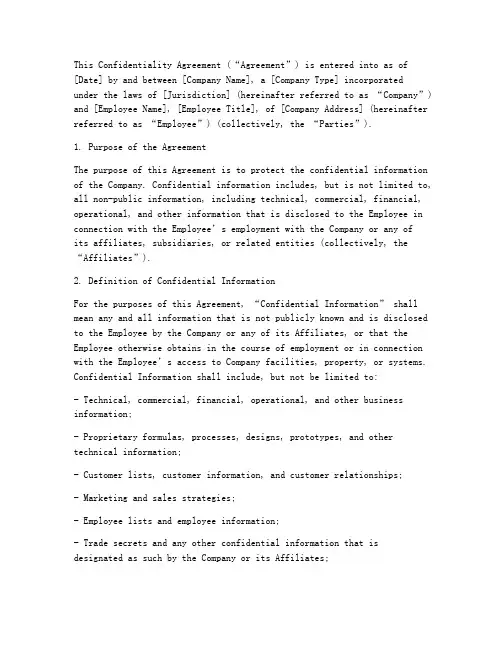
This Confidentiality Agreement (“Agreement”) is entered into as of [Date] by and between [Company Name], a [Company Type] incorporatedunder the laws of [Jurisdiction] (hereinafter referred to as “Company”) and [Employee Name], [Employee Title], of [Company Address] (hereinafter referred to as “Employee”) (collectively, the “Parties”).1. Purpose of the AgreementThe purpose of this Agreement is to protect the confidential information of the Company. Confidential information includes, but is not limited to, all non-public information, including technical, commercial, financial, operational, and other information that is disclosed to the Employee in connection with the Employee’s employment with the Company or any ofits affiliates, subsidiaries, or related entities (collectively, the “Affiliates”).2. Definition of Confidential InformationFor the purposes of this Agreement, “Confidential Information” shall mean any and all information that is not publicly known and is disclosed to the Employee by the Company or any of its Affiliates, or that the Employee otherwise obtains in the course of employment or in connection with the Employee’s access to Company facilities, property, or systems. Confidential Information shall include, but not be limited to:- Technical, commercial, financial, operational, and other business information;- Proprietary formulas, processes, designs, prototypes, and other technical information;- Customer lists, customer information, and customer relationships;- Marketing and sales strategies;- Employee lists and employee information;- Trade secrets and any other confidential information that is designated as such by the Company or its Affiliates;- Any information that, if disclosed, would reasonably be expected to harm the Compa ny or its Affiliates’ competitive position or business interests.3. Obligations of the EmployeeThe Employee agrees to:- Maintain the confidentiality of all Confidential Information received from the Company or its Affiliates;- Not use any Confidential Information for any purpose other than in the course of employment with the Company or its Affiliates, and then only to the extent necessary to perform the Employee’s duties;- Not disclose any Confidential Information to any third party without the prior written consent of the Company or its Affiliates;- Not make copies of Confidential Information except as necessary for the Employee’s job performance;- Return or destroy all Confidential Information upon termination of employment, or upon the Company’s r equest, whichever occurs first.4. Exclusions from Confidential InformationThe obligations of confidentiality shall not apply to information that:- Is or becomes publicly known through no fault of the Employee;- Is already in the Employee’s possession w ithout restriction in relation to disclosure prior to the time of disclosure by the Company or its Affiliates;- Is obtained by the Employee from a third party without a breach of such third party’s obligations of confidentiality;- Is independently developed by the Employee without use of or reference to any Confidential Information; or- Is disclosed by the Employee in response to a valid order of a court or other governmental authority, provided that the Employee provides theCompany with prior notice of such disclosure and cooperates with the Company in any legal action to obtain a protective order or similar relief.5. Term and TerminationThis Agreement shall remain in effect during the Employee’s employment with the Company and for a period of [Number] years following the termination of the Employee’s employment, regardless of the reason for termination. The Employee may terminate this Agreement at any time by providing written notice to the Company. The Company may terminate this Agreement at any time by providing written notice to the Employee.6. Governing LawThis Agreement shall be governed by and construed in accordance with the laws of [Jurisdiction].7. Entire AgreementThis Agreement constitutes the entire agreement between the Parties concerning the subject matter hereof and supersedes all prior agreements, negotiations, understandings, and discussions, whether written or oral, of the Parties.8. AmendmentsThis Agreement may be amended only by a written agreement executed by both Parties.9. WaiverThe failure of either Party to enforce at any time any provision of this Agreement shall not be a waiver of such provision or of the right to enforce such provision at any time thereafter.IN WITNESS WHEREOF, the Parties have executed this Confidentiality Agreement as of the Effective Date first above written.[Company Name]By: ___________________________Name: [Authorized Representative’s Name] Title: [Authorized Representative’s Title] [Employee Name]By: ___________________________Name: [Employee’s Name]Title: [Employee’s Title]。

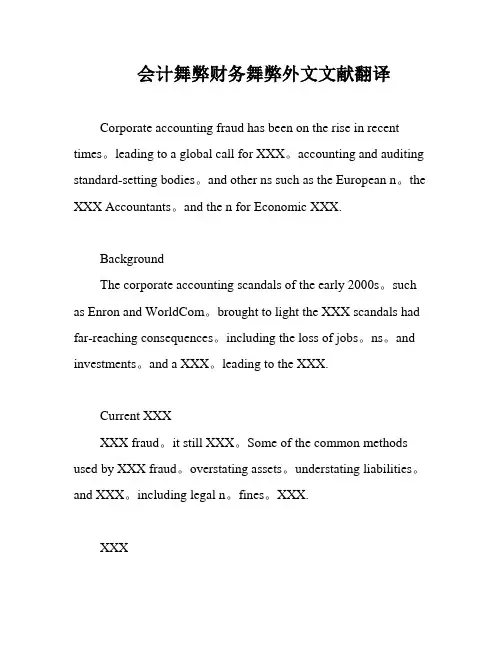
会计舞弊财务舞弊外文文献翻译Corporate accounting fraud has been on the rise in recent times。
leading to a global call for XXX。
accounting and auditing standard-setting bodies。
and other ns such as the European n。
the XXX Accountants。
and the n for Economic XXX.BackgroundThe corporate accounting scandals of the early 2000s。
such as Enron and WorldCom。
brought to light the XXX scandals had far-reaching consequences。
including the loss of jobs。
ns。
and investments。
and a XXX。
leading to the XXX.Current XXXXXX fraud。
it still XXX。
Some of the common methods used by XXX fraud。
overstating assets。
understating liabilities。
and XXX。
including legal n。
fines。
XXX.XXXXXX fraud。
us XXX increased transparency and disclosure requirements。
stricter ns。
and the XXX.nCorporate accounting fraud remains a significant issue。
but the global call for XXX。
XXX.During XXX United States。
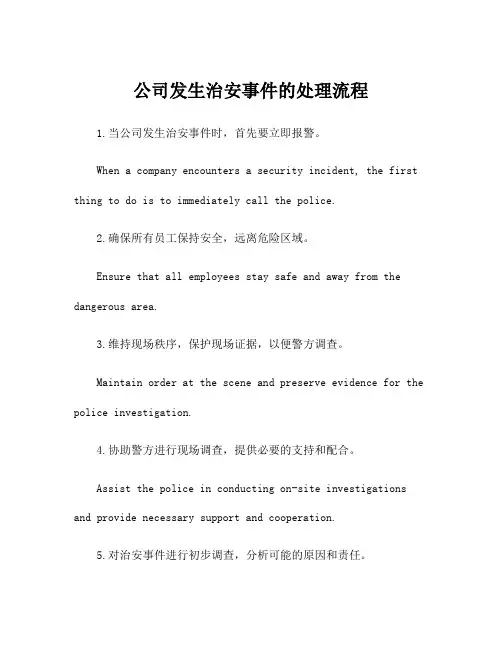
公司发生治安事件的处理流程1.当公司发生治安事件时,首先要立即报警。
When a company encounters a security incident, the first thing to do is to immediately call the police.2.确保所有员工保持安全,远离危险区域。
Ensure that all employees stay safe and away from the dangerous area.3.维持现场秩序,保护现场证据,以便警方调查。
Maintain order at the scene and preserve evidence for the police investigation.4.协助警方进行现场调查,提供必要的支持和配合。
Assist the police in conducting on-site investigations and provide necessary support and cooperation.5.对治安事件进行初步调查,分析可能的原因和责任。
Conduct a preliminary investigation into the security incident and analyze possible causes and responsibilities.6.与公司管理层和相关部门沟通,制定处理治安事件的详细计划。
Communicate with the company management and relevant departments to develop a detailed plan for dealing with the security incident.7.对员工进行治安事件处理的相关培训,提高应急处理能力。
Provide relevant training to employees on handlingsecurity incidents to improve emergency response capabilities.8.加强公司的安保措施,确保类似事件不会再次发生。

翻译:(汉译英)限量版咯咯!1. 这座房子在地震中损毁严重,汤姆花了不少钱来修它。
The house was badly damaged in the earthquake, and Tom spent a lot of moneyrenovating it.2. 正如史蒂夫·乔布斯所指出的,不断摸索一直都是苹果模式的一部分。
As Steve Jobs noted, trial and error has always been part of the Apple model.3. 如果你总是无所事事,最后结果会怎样呢?当然是失败If you are idling around all the time, what will you wind up with? Of course, failure.4. 别犯错———现在可是关键时刻,谨慎是永远不会错的Don’t make a blunder—it is a critical time now, and caution will never be wrong.5. 你不要为难自己,毕竟你是个新手。
You shouldn’t beat yourself up; after all, you are a green hand.1.政府正努力改善公众的住房条件。The government is striving for improvements in public housing.2. 这五个圆环被认为象征了五大洲:欧洲、亚洲、非洲、大洋洲以及美洲。The five rings are thought to symbolize the five continents: Europe, Asia, Africa, Oceania and America.3.他父亲淡淡地一笑,试图要他放心,一切都安然无恙。
His father smiled weakly in an attempt to reassure him that everything was all right.4. 他的沉默实际就是拒绝。
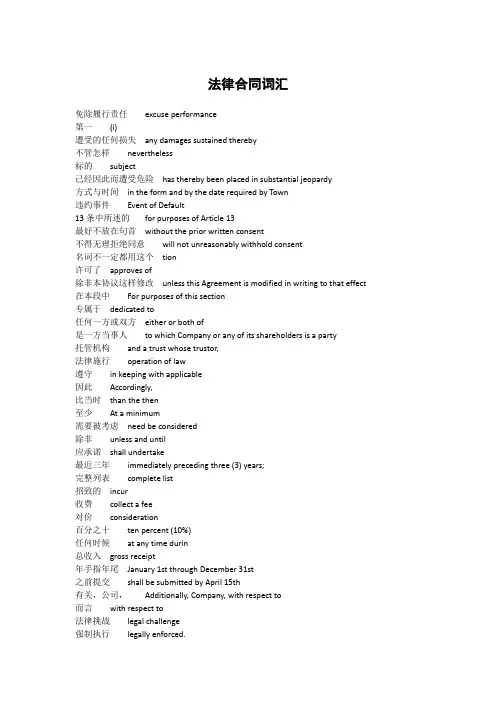
法律合同词汇免除履行责任excuse performance第一(i)遭受的任何损失any damages sustained thereby不管怎样nevertheless标的subject已经因此而遭受危险has thereby been placed in substantial jeopardy方式与时间in the form and by the date required by Town违约事件Event of Default13条中所述的for purposes of Article 13最好不放在句首without the prior written consent不得无理拒绝同意will not unreasonably withhold consent名词不一定都用这个tion许可了approves of除非本协议这样修改unless this Agreement is modified in writing to that effect 在本段中For purposes of this section专属于dedicated to任何一方或双方either or both of是一方当事人to which Company or any of its shareholders is a party托管机构and a trust whose trustor,法律施行operation of law遵守in keeping with applicable因此Accordingly,比当时than the then至少At a minimum需要被考虑need be considered除非unless and until应承诺shall undertake最近三年immediately preceding three (3) years;完整列表complete list招致的incur收费collect a fee对价consideration百分之十ten percent (10%)任何时候at any time durin总收入gross receipt年手指年尾January 1st through December 31st之前提交shall be submitted by April 15th有关,公司,Additionally, Company, with respect to而言with respect to法律挑战legal challenge强制执行legally enforced.客户customer(s)为回应in response to附件A至C. Exhibits A through C解释或解释construe or interpret仿佛as though有关‘pertaining to不论口述或书面whether written or oral对于with respect to胜诉方finally prevailing party签署executing文首所述first above written日期Dated: , 2009签署,手写By:证明人ATTEST:姓名Printed name手写姓名By:每周一次的手机for one time per week collection五英尺five feet (5')或一部分or portion thereof何处within five feet (5') of where在一个客户处at more than one (1) customer费用分摊will be split between the number of customers多用动名词Measuring多用复数Devices有助于that contribute to缩写Quality Management System (QMS)在本文件特别规定的范围内to the extent specifically set forth herein该复数就复数Records Management Policy要求手册Requirements Handbook股票代码ticker symbol达到什么样的标准our facilities are, at a minimum, certified to the ISO文件化程序documented procedures针对具体部门的管理系统sector-specific management system至少,from a minimum of随时待命service on an on-call basis税率表rate schedule体质弱,老人frail or elderly协助assist in随时的On-Call任选其一for either:难以处理的物件hard to handle items一个时段到另一个时段on regular collection days each year from December 26 through January 15.一个时段,picked up three times per week October 1 through February 28最大化满足需求that best meets their needs.计划program之前By October 15,开始的commencing January 1 of the following year.每三年中的两年two out of every three years三年中的两你那will continue to be used two out of every three years强调underlie句号II.相当于shall equal the高于其实际成本at more than their actual cost引致的incurred by Contractor除以0.905 by dividing the forecasted annual cost of operations, which shall be determined in accordance with these procedures, by 0.905与下列金额相等shall be equal to the sum of the following:从何处from where公布的as posted at审批程序vetting process基层经理Line Manager有助于确保will serve to ensure that在。
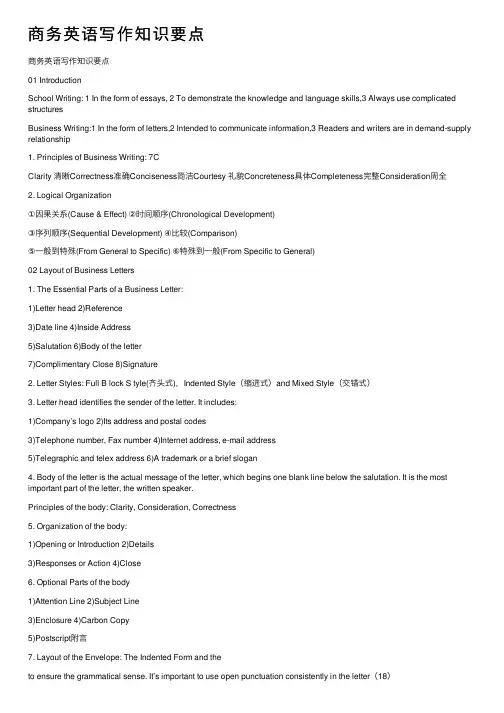
商务英语写作知识要点商务英语写作知识要点01 IntroductionSchool Writing: 1 In the form of essays, 2 To demonstrate the knowledge and language skills,3 Always use complicated structuresBusiness Writing:1 In the form of letters,2 Intended to communicate information,3 Readers and writers are in demand-supply relationship1. Principles of Business Writing: 7CClarity 清晰Correctness准确Conciseness简洁Courtesy 礼貌Concreteness具体Completeness完整Consideration周全2. Logical Organization①因果关系(Cause & Effect) ②时间顺序(Chronological Development)③序列顺序(Sequential Development) ④⽐较(Comparison)⑤⼀般到特殊(From General to Specific) ⑥特殊到⼀般(From Specific to General)02 Layout of Business Letters1. The Essential Parts of a Business Letter:1)Letter head 2)Reference3)Date line 4)Inside Address5)Salutation 6)Body of the letter7)Complimentary Close 8)Signature2. Letter Styles: Full B lock S tyle(齐头式),Indented Style(缩进式)and Mixed Style(交错式)3. Letter head identifies the sender of the letter. It includes:1)Company’s logo 2)Its address and postal codes3)Telephone number, Fax number 4)Internet address, e-mail address5)Telegraphic and telex address 6)A trademark or a brief slogan4. Body of the letter is the actual message of the letter, which begins one blank line below the salutation. It is the most important part of the letter, the written speaker.Principles of the body: Clarity, Consideration, Correctness5. Organization of the body:1)Opening or Introduction 2)Details3)Responses or Action 4)Close6. Optional Parts of the body1)Attention Line 2)Subject Line3)Enclosure 4)Carbon Copy5)Postscript附⾔7. Layout of the Envelope: The Indented Form and theto ensure the grammatical sense. It’s important to use open punctuation consistently in the letter(18)03 E-mail/doc/e815a6a5f524ccbff1218414.html yout of Heading1)T o: (email address of the recipient )2)From: (email address of the sender—usually automatically filled in)3)Date: (automatically filled in)4)Subject (main idea of the message)5)Cc: (carbon copy– recipients whom the author wishes to inform of the message publicly)6)Bcc: (Blind carbon copy- recipients who are secretly being informed of the message)7)Attachment (the files you desire to send along with the message)2. Body: Salutation + Content + Complementary Close + Signature3. Points to ponder when writing1)Write a meaningful subject line.(主题栏意义明确)2)Keep the message focused and readable.(⾏⽂重点突出、排版清楚易读)3)A void attachments.(少发或不发附件)4)identify yourself clearly.(标明⾝份)5)Be kind. Don’t flame.(⼼平⽓和)6)Proof read.(仔细较读)7)Don’t assume privacy.(注意保护隐私)8)Distinguish between formal and informal situations.(分清场合和事宜)9)Respond promptly.(及时回复)10)Show respect and restrain.(宽容限制)04 Good News & Bad News Letters1. 商务信函种类:1)询盘enquiries2)发盘response to enquiries3)订单函order4)订单确认函order acknowledgement 5)确认函confirming letter6)拒绝函declining letter7)礼节函social letter8)建⽴商务关系的信函(买⽅或卖⽅之间)Establishment of business relationship2. General structure of Good News Messages and Neutral Messages——Direct Approach3. Occasions of Direct Approach1)Making enquiries or responses to enquires2)Making orders or order acknowledgements3)Confirming letter 4)Social letters 5)Declining letter 6)Establishment of business relationship4. Structure of Good News Letter:1)Begin with the main point (Introduction)2)Present necessary explanations (Details)3)Cover the remaining part of the objective (Action)(询价)4)End with adapted goodwill (Close)5. Useful sentences for closing of the good news letter:1)Looking forward to hearing from you.2)I hope this information will help you.3)We look forward to receiving confirmation of the reservation.4)It’s great to be worki ng together once again.6. Indirect Approach to Bad News Messages1)Don’t tell the bad news at the beginning.2)Begin with some good news or neutral information.3)Give explanations before releasing bad news.7. General Structure of Bad-news Messages:1)Begin with a buffer缓冲(introduction)2)Explain why the refusal has to be made (details)3)State the refusal (action) 4)Close positively (close)8. State the Refusals1)Make the refusal clear without misunderstanding.2)Offer some constructive and feasible suggestions.9. Close of Bad News Letter:1)Polite 2)Positive 3)Confident4)Do not remind your readers of the negative message.5)Do not apologize for your refusal10.Ways to buffer:1) Showing positive attitude, appreciation2) Showing sympathy and care3) Demonstrating understanding11. U seful sentences for explaining why the refusal has to be made (Present objective, reasonable and convincing reasons. Make the impression that the refusal is necessary and based on careful consideration)1) Had we not gone through careful and thorough in vestigation, we wouldn’t have made such a decision.2) It is on the basis of careful consideration that we made such a decision.12. To be avoided: We mustreject/turn down/refuse/disappoint youY ou surely understand …..We were surprised at your request.Y ou claim / Y ou state in your letter…This is the best we can do05 Complaint Letter1. Inevitable Complaints:1)Improperly filled order 2)Damaged merchandise商品;货物3)Misunderstanding about prices2. Direct approach to Complaints and Claims:Business people want to know as soon as possible when something wrong has happened to their products or services so that they can correct the situation immediately. Directness lends to clarity of purpose and success.3. Types for complaints1)Complaint for Poor Quality2)Complaint for Shortage3)Complaint for Invoice Mistake 4)Complaint for Delivery Delay5)Complaint for Wrong Items6)Complaint for Poor Packaging4. Structure of Complaint letter1)Explanation of Problem + Background Information (what situation, when, color, model No.)help to identify the problem + How Y ou Suffered (if necessary)2)Action required with deadline ( replace the faulty goods, refund the money, repair the goods, etc)3)Warning (strong but polite)5. Reply to Complaint Letter(括号内是句型)1)Explanation the problem + Background(T hank you for your letter of…About our delay ofshipment. We are sorry for not having been able to deliver the goods you ordered o n)2)Action required + Deadline (We take theresponsibility for the mistake and we willarrange for the replacement to be sent toyou within two da ys.) 3)Ending (Poli te We can assure you thatevery effort will be made to ensure thatsimilar erro rs.)6.U seful Sentences for Complaint Letter1)Describe the problem:On examination, we found all the goods were wetted.2)Action Required:Therefore, we are compelled to claim against you. We appreciate your seeing the matter seriously and arranging for the delivery within 5 days.3)Strong Demand:We will ask for the law if you cannot send the goods to us within 10 days.4)Courteous demand for action:In view of our friendly business relations, we are sure that the matter will be settled appropriately06 Persuasion/sales Letter(促销/推销函)1. Approach of Persuasion Letter——Indirect Approach2. General structure——AIDA1) T o Arouse Attention2) T o Create Interesta)Benefits of the goodsb)Choose the right appeal to feature your product or servicec)Appeals mean the strategies you use to present a product or service to your readers.d)Emotional Appeals: How people feel, taste, smell, hear, and see. Strategies that arouse people through love, anger, pride, fear, and enjoyment.(Perfume, candy And food etc.)e)Rational Appeals: Reason---thinking mind. Strategies based on saving money, making money, doing a job better, or getting better use from a product.(Automobile tires,Tools,Industrial ,equipment)3) Desire: T o Convince the readera)Benefits of the goodsb)Point out and stress all the benefits that your product can offerc)Determine the strongest psychological selling point:stressing a product’s benefits rather than its physical features4) T o Motivate Actiona)Ask for orders.b)Offer other incentives that will make your reader responsive: a gift, a limited availability and a discount.c)No-risk guarantee. d)Strengthening words.3. Principles of Persuasion Letter Writing1)Vivid language. 2)Be concrete.3)Focus on central selling point. 4)Use inductive(归纳)approach (deductive演绎).5)S ome ―don’t‖ in Persuasion letter.a)Don’t exaggerate.b)Don’t belittle your reader.c)Don’t speak ill of your competitors.Show the reader what you can do, but not what others can not do!07 Memo/memorandum1. Components of Memo1)HeadingMEMORANDUM / C ompany’s Logo / SloganT o: (reader’s name and job title)From: (writer’s name and job title)Date: (complete and current date)Subject: (what the memo is about, highlighted in some way) ---Informative2)BodyOpening---state the purpose---DirectDetails---Highlighted3) ClosingAction or Conclusive Sentence2. Characteristics of Successful Memos1)Subject Headings 2)Single topic3)Conversational tone—Informal 4)Conciseness---A void Wordy Sentences 5)Visual Signaling:numbers/ bullet s编号?boldface斜体italics斜体?heading3. Three points to A void1)A void abruptness 2)A void over-politeness3)A void unnecessary expressions4. AttentionInside the companyOne topic in one memoWithout company letterhead08 Meeting MaterialPart 1 Notice1. The Nature of Notice1)Purpose: To give information briefly and make the reader follow the message quickly2)Form to expressa)written on a blackboard or bulletin board公告板b)written as a memoc)written as a letter d)written as a postcarde)written in an email2. Types of NoticeMeeting noticeNotice for Greeting New Colleagues Holiday Notice Practice Notice3. Layout of Notices1)Heading (Subject matter or Notice)2)Body (time, place, purpose, materials)Full-blocked formUse asterisks or bullet points or numberLeave spaces between headings and different sectionsUse capitals, bold, italics or underlyingUse sub-headings3)Name and position(右下⽅4)Date(右下⽅4. Language Tone of Notices: Brief; Specific; Eye-catching; Polite5. Useful expressions1)请注意……Please note that…2)我们很⾼兴通知您……We are pleased to inform you…W e have pleasure in informing you that…3)我们想通知您……We would like to notif y you…4)我们特此奉告……We have the honor to apprise you of…5)我们冒昧奉告……We take the liberty of announcing to you that…Part 2 Meeting Agenda6. Difference between Agenda & Schedule:1)An agenda: T opics to be discussed at a meeting; before the meeting is held.2)Schedule: Work timetable.agenda是会议的议程,代办事项表。
Unit5 词汇-情景破知识点1 take…for granted认为…理所当然In fact,we are so used to them that we may even take them for granted without realising how much inspiration they have given us.(教材P50)事实上,我们如此习惯于它们以至于我们可能甚至把它们视为理所当然,而没有意识到它们给了我们多少灵感。
情景导学We shouldn’t take it for granted that parents should give their children money.我们不应该理所当然地认为父母应该给孩子钱。
Don’t take what he says seriously. He likes making fun of others.不要把他的话当真。
他喜欢取笑别人。
I sincerely hope that you will take my suggestions into account/consideration.我真诚地希望你能考虑我的建议。
归纳拓展①“take...for granted”接that从句作宾语时,常用it作形式宾语,构成“_____________”结构。
②take... seriously _____________③take... into account/consideration_____________链接高考单句语法填空1-1(2019江苏,完形填空改编,★☆☆)Human beings took ________for granted that their brains held all the solutions but maybe their hearts can be a better guide.1-2(2018浙江,七选五,★★☆)Second,take the overall appearance of the neighborhood ________(serious).1-3(2018浙江11月,阅读理解A,★★☆)They must take ________account the time of day-in rush hour,a longer route(路线)may be quicker-and describe the best way.完成句子1-4(★★☆)要十分认真地对待你的教育你的未来就靠它了。
Responsestocomments(英文期刊审稿意见回复)Dear Editor-in-Chief in XXXXXXX:Thank you very much for your help in processing the review of our manuscript (Manuscript ID XXXXX). We have carefully read the thoughtful comments from you and reviewers and found that these suggestions are helpful for us to improve our manuscript. On the basis of the enlightening questions and helpful advices, we have now completed the revision of our manuscript. The itemized responses to the reviewers’ comments are listed in the succeeding sheets. We hope that all these corrections and revisions would be satisfactory. Thanks a lot, again.1.Title: XXX2.Manuscript type: Article3.Corresponding author: XXX4.Full author names:XXXSincerely,Prof. XXXSchool of Chemistry and Chemical Engineering,XX Key Laboratory of Controllable ChemistryReaction & Material Chemical Engineering,XX University,Wuhan, Hubei, 430072 , P R China.2015-03-05Responses to comments of EditorThank you for your serious and constructive comments on our manuscript. According to your suggestion, the manuscript has been revised as a letter to editor. The revisions we have made are as follows:1 Subtitles "5. Conclusions", "6. Acknowledgments", and "7.References" should be revised into "4. Conclusions", "Acknowledgments", and "References", respectively.Reply:Thank you for your constructive and helpful suggestion.The relevant subtitles have been revised in the revision.2 In the section of the References, title of cited paper should be removed, and in ref.35 the superfluous comma should be deleted. Reply:Thank you for your constructive and helpful suggestion.All the titles have been removed as you required and the superfluous comma in ref.35 has also been deleted.3 Numerous relevant papers have been published in recent years especially in 2014 and 2015. Some key, important or/and latest research results in this field, should be mentioned and cited in the section of introduction instead of outdated or earlier papers so that we can provide a solid background and progress to the readers regarding the current state-of-knowledge on this topic. Therefore, I strongly require you to rewrite this part and then update your citations.Reply:Thank you for your constructive and helpful suggestion.We have rewritten the section of introduction and updated corresponding citations as you required. In detail, some recent and excellent researches have been cited in the revision to replace those of earlier papers which are no longernovel.4 Any changes or revisions in the text should be highlighted by different color in the revised manuscript compared with that of the previous version.Reply:Thank you for your constructive and helpful suggestion.All the changes and revisions have been highlighted by cyan.We have revised our manuscript againWe have made further modifications on the manuscript, especially the introduction section. The latest revisions are highlighted by green, while previous changes are highlighted by cyan.To be specific: a) Some adjustments about sentence structures have been made to increase the diversity of expression.b) The second example about N-doped carbon materials is relatively early research result published in 2009. Thus we have replaced it with a lasted and outstanding paper.c) The unique effects of S-doping have been expounded in the revision to correspond to the effects of N-doping introduced above.d) In addition to rewriting the part of introduction as you required, we have also polished and revised the chapters of experimental, results and discussion, conclusions and updated the section of references.The initial examples about N-S-codoped carbon materials (references16 and 17) are earlier results published in 2012 and 2013. Thus we have replaced them with some lasted and outstanding papers.。
名词性从句汉译英练习 (全)1.关键在于你是否已经尽力完成了任务。
2.令我惊讶的是,通过努力,有如此之多的人打破了世界纪录。
3.令我高兴的是,我一直梦想的学校——XXX录取了我。
4.他曾经来过中国,使所有在场的人都感到激动不已。
5.是否有他抢劫银行还需要进一步调查。
6.明天是否举行运动会取决于天气如何。
7.他没有准时出席会议的原因是遇到了交通堵塞。
8.我妈妈伤心的原因是她丢了一个包,里面装有很多重要文件。
9.他在会议上解释这次事故的原因是有人玩忽职守。
10.这就是他处理这件事情的方式,这让我很担心。
20.毫无疑问,政府将采取措施防止疾病蔓延。
21.会议是否按计划举行仍未最终决定。
22.她迟到的原因是因为要照顾生病的妹妹。
23.中国参加XXX组织不仅是一个巨大的挑战,也是一个很好的机遇。
24.据报道,至今已有91名儿童在洪水中丧生。
25.人类不得不接受这样一个事实:由于温室效应,全球气候正在变暖。
26.金属为什么能导电是一个有趣的问题。
27.目前还不知道这一理论是何时形成的。
XXX。
7.这个城市的治安情况正在逐渐变得越来越好。
The public XXX。
8.他们已经决定了下一步的计划,但是还没有公布。
They have decided on the next plan。
but it has not been announced yet。
9.我希望你能够理解我的立场。
I hope you XXX。
10.这个问题需要我们大家共同努力来解决。
This problem requires all of us to work together to solve it.1.We will start the experiment only if we have sufficient XXX.2.XXX.3.Please award the prize to the first person who arrives.4.As children grow up。
企业回复劳动仲裁范文模板英文回答:Response to Labor Arbitration.Introduction.We, [Company Name], are writing to respond to the labor arbitration claim filed by [Employee Name]. We understand that this is a serious matter and that we must address the allegations made in the claim. We take these allegations seriously and are committed to resolving this issue fairly and equitably.Background.The employee alleges that they were wrongfully terminated from their position as a [Employee Position] on [Termination Date]. The employee claims that the termination was in retaliation for their [ProtectedActivity] and that the company violated their rights under the [Applicable Law].Company's Position.We deny the allegations made by the employee. We believe that the employee was terminated for legitimate, non-retaliatory reasons. We have conducted a thorough investigation into the matter and have found no evidence to support the employee's claims.We believe that the employee's performance was not meeting the expectations of the company. We provided the employee with feedback and coaching on several occasions, but their performance did not improve. We ultimately made the decision to terminate the employee's employment because we believed that it was in the best interests of the company.We do not believe that the employee's termination was in retaliation for their [Protected Activity]. The employee was terminated because of their poor performance. We have along history of treating our employees fairly and equitably, and we do not tolerate discrimination or retaliation.Conclusion.We are confident that we will prevail in this arbitration. We believe that the employee's claims are without merit and that we have acted lawfully andreasonably throughout this process.We are committed to resolving this matter fairly and equitably. We are willing to participate in mediation or other alternative dispute resolution processes in order to reach a mutually acceptable resolution.中文回答:劳动仲裁答辩范本。
法务审查法律意见的答复范文英文回答:Legal Opinion Review Response Template.Introduction.The purpose of a legal opinion review is to provide an independent assessment of the legal analysis and conclusions expressed in a legal opinion. The review should be conducted by a qualified legal professional who is not affiliated with the issuer of the legal opinion.Scope of Review.The scope of the legal opinion review should be clearly defined in the engagement letter. It should include, at a minimum, the following:A review of the facts and circumstances underlying thelegal opinion.An analysis of the applicable law.An assessment of the legal reasoning and conclusions expressed in the legal opinion.Process.The legal opinion review process should be conducted in a thorough and professional manner. The reviewer should:Request and review all relevant documents.Interview the issuer of the legal opinion, if necessary.Perform independent research on the applicable law.Prepare a written report that summarizes the findings of the review.Report.The legal opinion review report should be clear, concise, and well-organized. It should include the following:A summary of the facts and circumstances underlying the legal opinion.A discussion of the applicable law.An analysis of the legal reasoning and conclusions expressed in the legal opinion.A statement of the reviewer's opinion regarding the validity of the legal opinion.Conclusion.The legal opinion review report should provide a clear and concise assessment of the legal analysis and conclusions expressed in the legal opinion. The reportshould be used by the recipient of the legal opinion to make informed decisions regarding the matter at hand.中文回答:法务审查法律意见的答复范文。
1.这本书几乎涉及了关于语言教学的所有重要论题。
This book covers nearly all the important topics on language teaching. 2.如果你来电话时我不在,请给我的秘书留个口信。
If I am not available when you call me,please leave a message with my secretary.3.只有高级官员才能接触到这些机密档案。
Only high-ranking officials have access to these confidential files.4.看见火车轰隆隆地向他开来,他立刻的反应就是跳离铁轨,但双腿却不听使唤。
When he saw the train roaring towards him,his immediate response was to jump off the rail,but his legs refused to move.5.他这么聪明,而且又用功,毫无疑问,他将来会成功的。
He is so clever and he works hard. No doubt he will be successful in the future.6.当着两个证人的面,他在遗嘱上签了自己的名字。
He signed his name on his will in the presence of two witnesses.1.在新闻发布会上,这位政府发言人思维敏捷,彬彬有礼地回答了记者们的提问。
At the press conference,the government spokesman answered journalists' questions with promptness and courtesy.2.教育应当使一个人变得丰富而不是富有。
Education is supposed to make one rich, not wealthy.3.他因为遵从父亲的愿望才读了法学院.He went to law school out of respect for his father's wishes.4.种子随风飘荡,也不知飞向何方。
RESPONSE TO THE GOVERNMENT’S WHITE PAPER ON MODERNISINGCOMPANY LAW1.0SUMMARY1.1This paper sets out the Agency’s response to the Government’s White Paperon Modernising Company Law (Cm 5553 Vols I & II) with annexes on why we have a significant interest in company law and our policy on corporate environmental governance.1.2The Agency welcomes the White Paper and regards it as an importantopportunity to embed the link that good environmental management and good company performance go “hand in hand” in Company Law because of the competitive advantage this will give UK business in wider international markets.1.3Better Company Law will also make it easier for us to do our job of regulatingcompanies’ environmental behaviour. By strengthening aspects of the draft Bill (see below) we believe we would be able to reduce our regulation of companies with good environmental performance, and target our efforts more on poor performance.1.4We also believe there are lacunae between aspects of company law andenvironmental law that need to be closed (e.g. company law allows company directors to walk away from their obligations in respect of environmental liabilities on insolvency through disclaiming an environmental licence from the Agency as onerous property). This Bill could provide an opportunity to remedy such situations.1.5We are pleased that some aspects of our previous responses to theindependent Company Law Review team have been taken on board (e.g.reference to the environment as a key business issue in the new Operating and Finance Review (OFR) in Annual Reports and Accounts).1.6However we are disappointed that other, and more fundamental aspects,which would benefit the reputation of UK business that do not necessarily need to be onerous, unfortunately do not appear to have been taken on board such as•placing a statutory duty of care for the environment on Company Directors•compulsory reporting of companies’ environmental risk management and environmental performance in the new OFR.1.7We would welcome a meeting with Ministers and the Bill Team to discuss ourresponse and possible opportunities to assist and work with the DTI on refining and developing the Bill and associated secondary legislation andcompany reporting standards where there is a need for input of environmental expertise.2.0COMMENTS ON SECTION 1 - WHY REFORM IS NEEDED2.1We fully support the Government’s desire to simplify and modernise CompanyLaw, though we note the White Paper and draft Bill will only regulate the way companies are set up and run butnot law on how companies are listed and traded on the stock exchangenor the taxes companies paynor the rules by which companies buy and sell goods and services.nor insolvency law on how companies are wound upnor how company directors can be disqualified from running another company 2.2Thus this White Paper only partially deals with simplifying and modernising theoverall legal regulation of companies’ activities which all affect our overall economy and environment. We think the Government should also look at these other related laws so they are also reformed and modernised (either concurrently or in the near future) so that all company related law is based on “joined up” thinking and policies.2.3This view is based on our experiences in regulating both solvent and insolventcompanies causing environmental problems, plus recent research of the incomplete disclosure of environmental considerations in a company’s future strategy in its listing documents.2.4For example, at present company directors can legitimately walk away fromenvironmental liabilities they have caused (e.g. polluting groundwater and public drinking water supplies) by forming a new company and leaving a financial liability with the insolvent old company (Hunts Refuse Ltd at Helpston). This has resulted in public funds having to be used to clean up the pollution and protect public health.2.5We welcome the fact the Government recognises the links between this WhitePaper and other concurrent EC and UK developments and consultations on- implementing a new EU Directive on the application of International Accounting Standards in the UK from 2005- several new draft EC Directives (Prospectus Directive, Company Disclosure Obligations, Corporate Governance Directive) on informationthat has to be published when a company issues shares, seeks a stockexchange listings, and reports to the stock markets.- related reviews in the UK of company listing rules, the role of non-executive Directors, effectiveness of the regulation of financial reportingand auditing, the law on company charges, and Cabinet Office reviews onthe disclosure of beneficial interests in unquoted companies, and reform ofcharity laws.2.6However, we note the contents of these have not yet been incorporated intothe White Paper or draft Bill and that it also does not mention the recently agreed EC recommendations on environmental issues in company annualreports and accounts, and corporate social responsibility which are also of importance and significance to future Company Law.2.7The latter two are of particular interest to the Agency and we suggest that asan EU member state these recommendations are incorporated into any future new UK Company Law. The draft Environmental Liability Directive will also have implications for some UK companies.3.0COMMENTS ON SECTION II – THE GOVERNMENT’S POLICYThe right approach3.1We note and agree in principle that new company law should consider thelarge number of smaller largely private companies first with different provisions for the fewer larger public companies.3.2However, in practice, we have concern about institutionalising lighter touchcorporate regulation of small companies because the majority of pollution incidents are caused by SMEs. If smaller companies activities (some of which are exempted from environmental regulation) are only lightly regulated by new company law as well, it is likely to be impossible to seek tougher environmental regulation of them, which will make our job harder, and may result in the EU taking infraction proceedings against the UK Government.3.3We would recommend that new company law should require both small andlarge companies to account for and report to a minimum standard the following - the volume of raw materials, water and energy used, plus waste and emissions produced. This would help reduce waste production and pollution, and increase their productivity, resource efficiency, competitiveness and profitability. This would also help the Government achieve other wider sustainable development policy and economic objectives.Improving governance : DirectorsGeneral duties (question 1)3.4While we welcome Clause 19 and Schedule 2 in Vol. 2 of the draft Bill - thatDirectors should cover the short and long term consequences of their action, where relevant, and take into account, where practicable relevant matters, such as their relationships with employees and the impact of the business on the community and on the environment, we do not think the qualifiers where relevant or practicable are necessary as we do not consider there are any real life circumstances or examples of companies which are not affected by some environmental influences on their activities - which all company directors should be aware of - such as the- impacts of natural events such a droughts, storms, and floods,-availability of raw materials and energy from coal, gas, nuclear sources -impact of EU environmental legislation-impact of climate change-environmental impact of their supply chain-the disposal of their waste products.3.5Therefore, we recommend that Company Directors should be given a statutoryduty of care towards the environment in the same way as they have to their employees and customers. This then removes any ambiguity and makes the law crystal clear. Company Directors should be made liable for any negligence or wilful misconduct in relation to the environment.3.6We also support the proposal that Companies House should send Directors ofboth public and private companies a leaflet summarising the main legal requirements on them by various laws – and we recommend this is also extended to cover laws relating to the environment, as well as health and safety etc. We would be happy to assist and support the drafting of such guidance. Our “NetRegs” webpages are facilitating this for SME’s.Duties in relation to creditors (question 2)3.7We support the proposal that the law should make reference to companies’obligations to their creditors – as we regard the environment as being a creditor - damage to it should be made good by the company causing it.3.8Under current law a company director can set up and move the assets from anexisting company to a new company, leaving the original company insolvent with various liabilities such as contaminated land or polluted groundwater which subsequently has to be cleaned up using public funds to protect public health. The White Paper and draft Bill are silent on this issue and the restructuring of companies generally so liability ownership is transferred and not orphaned.3.9Also even where financial provisions have been made in company accounts tomeet post closure environmental obligations for up to 30 years (so that there is no further pollution risk) the availability of this money to meet environmental licence conditions can be called into question as being onerous property by company liquidators.Company reporting and audit3.10We support the Government’s view that “good reporting is essential forshareholders, as well as creditors, employees, and others who may have an interest in companies and their activities – and improving the quality of reporting rather than the mere quantity of reporting”3.11However, we recommend that Government should extend this policystatement and make it explicit that “others” include all the key company regulatory bodies like the Financial Services Authority, Companies House, the various OF-bodies, and Environment Agency, as well as wider stakeholders such as institutional investors like Pension Funds, NGO’s, and public.3.12We consider there may be scope to simplify the various company reportingrequirements of the EU, Government, the Agency, and the OF-bodies so information is collected just once. For example it might be possible to combine the information requirements of several EC environmental directives into one electronic proforma. (e.g. environmental emissions data collected under the IPPC Directive and environmental expenditure data collected under Business Statistics Directive). This would reduce data handling costs and helpcompanies, the Agency, and Government. There should also be an obligation on utility suppliers to provide this information.3.13We note the proposal that the form and content of company annual report andaccounts will not be in the Bill but will be devolved to a new Standards Board.We recommend that disclosure requirements that are in the wider public interest such as company reporting on environmental issues should be included in the Bill and detailed in mandatory statutory guidance.3.14In this respect we recommend that key environmental issues are summarisedin the proposed new OFR and that specific issues relating to the environment should be disclosed in supplementary statements or reports which should be subject to independent audit and verification.Operating and Financial Review (OFR) (questions 43-58)3.15We welcome the Government’s proposal that in the new OFR Directors shouldreport on their “company’s policies on environment issues relevant to the company’s business”- which the Government believes every Director needs to “consider” as “first amongst equals”. However we would recommend this should not be left to the discretion of individual directors and companies to “consider” what are “material environmental issues” and whether to report on or not to their shareholders, and wider public interests – and it must also include performance against these policies.3.16We recommend that reporting on their risk management and performance inrelation to the environment should be a compulsory part of the OFR, as we do not know of any real life circumstances where companies are not affected by significant environmental influences on their activities that their directors should be aware of - such as the importance and impact of :-natural events such a droughts, storms, and floods,-availability of raw materials, water and energy-their supply chain-EU environmental legislation-climate change-the disposal of their waste products.3.17We think this would also help the Government achieve other wider sustainabledevelopment policy objectives in these areas, which could be achieved without being to onerous through use of simple generic and specific sectoral performance indicators agreed with business to generate consistent and comparable reporting.3.18We note it is the Government’s intention to devolve to an independent“Materiality Advisory Group” of experts to help provide guidance to the proposed new Standards Board on how to assess whether an item is material to their company, and hence if it should be included in OFRs. This which only need to be produced by the 1000 economically largest companies (0.1% of registered companies covering just 25% of corporate economic activity).3.19We consider that this requirement should not simply relate to the 1000 largestcompanies in terms of economic materiality (ie public companies with aturnover greater than £50million or more than 500 employees and private companies with a turnover greater than £500 million and 5000 employees).3.20We recommend it should be based on the environmentally most significantcompanies defined by consumption of raw materials/energy and/or production of waste/emission of pollutants and apply to all companies with more than 250 employees, as these are better proxy measures of environmental significance.3.21Given we are the main environmental regulator of UK companies we aredisappointed to have been advised by DTI officials we are too specialised to be on this group and only asked to submit written evidence to it. We look forward to doing this in early 2003.Keeping the law up to date – institutional arrangements3.22We welcome the Government’s proposal that the law should be kept up todate and respond to the changes in the environment in which companies operate, especially in view of the predictions of climate change.3.23We note the Government’s proposal to retain the Financial Reporting Councilas an “umbrella body” to oversee the Standards Board (responsible for standard setting for financial reporting, the content of the OFR including non-financial information, and reviewing the Combined Code on Corporate Governance) and a new Reporting Review Body (responsible for their enforcement) along with Government itself. We note this complex triangular regulatory structure is to be funded by Government grants, accountancy bodies, and the City, and we agree that these bodies will need very broad independent membership to reflect their broad remit and wider public interests.Other ways of simplifying and streamlining the law (question 6)Disclosure of convictions3.24We think that Companies should disclose their directors’ criminal convictionsin their Annual Report and Accounts, including those for offences relating to wildlife and environmental legislation. In addition to information on prosecutions and fines for criminal offences by companies made public by the Agency and Health and Safety Executive, we consider there should also be an electronic public register of convictions for offences under Company Law maintained by Companies House.4.0CONCLUSIONS4.1The Agency believes the Company Law Review is an opportunity forGovernment to integrate sustainable development into future Company Law which need not be onerous.4.2This will help increase the long-term competitiveness of UK companies byreducing environmental risks, wastage and lost productivity, and improve UK companies’ profitability and reputation.4.3The Agency hopes that Ministers will consider our recommendations, and wewould be happy to discuss our response or provide further information to theBill Team, especially on those points on which they are not inclined to accept the Agency’s advice.4.4We would also welcome the opportunity to provide environmental expertise(for example on environmental risk assessment, environmental assets and liabilities, and non-financial performance measures) to either the Bill Team and/or the Materiality Advisory Group and Standards Board drafting the new company law and associated company accounting and reporting standards. FURTHER INFORMATIONPlease direct any queries about this response to :Howard Pearce, Head of Environmental Finance, Environment Agency, Rio House, Waterside Drive, Aztec West, Almondsbury, Bristol BS32 4UD.Tel: 01454 624332 Fax: 01454-624031.E-mail:howard.pearce@December 2002ANNEX 1 – OUR INTERESTS IN COMPANY REGULATIONGeneral backgroundThe Agency is a non-departmental public body sponsored by Defra and the NAW. We are responsible under the 1995 Environment Act for protecting and improving the environment, and contributing towards the aim of achieving sustainable development, across England and Wales.We currently regulate around 300, 000 companies who are required to apply for and comply with various Agency “licences to operate” to legally carry out their business. New EU measures will extend the number of companies who we regulate to around 1,000,0000 in 5 years time. We also provide advice on environmental management to thousands of SME’s, and issue flood warnings to all companies with buildings situated on flood plains.Before using our formal enforcement powers and the courts, the Agency prefers to encourage companies to adopt best practice environmental management techniques, and we provide waste minimisation and pollution prevention advice to licence applicants as part of our broad approach to regulation.We are also seek to influence company boardrooms and financial institutions investment decisions through our annual “Spotlight on Business Environmental Performance” league tables, that highlight good and bad environmental performance. In 2001 we found it necessary to pursue and obtain nearly 2000 criminal convictions against companies and individuals for illegal acts under various statutes. While the highest fine awarded was £100,000 the average fine imposed by the courts on companies was only £6,400. Both these figures are extremely low in relation to many companies financial turnovers. This makes it cheaper for companies to budget for polluting the environment than to prevent it happening.Companies and sustainable developmentThe Agency believes that the principles of sustainable development and good environmental management, which are widely supported throughout the world and by the Government, should be incorporated into new Company Law. We think that the UK should lead the world in its approach to corporate environmental governance. The Agency believes that the Company Law Review offers the Government an important and timely opportunity to reform and modernise UK company law, so that the internationally agreed principles of sustainable development are embodied into the heart of corporate governance at the start of the 21st Century.The growing awareness both locally and globally of the need to protect the environment for future generations is leading to stricter regulatory standards and increasing costs for the use of limited natural resources. Therefore, it will be companies that treat the environment as a key business issue who will be the most sustainable and competitive in the future.There is an opportunity for the Government to demonstrate leadership by creating a new statutory framework for corporate environmental governance that will be respected and emulated across the globe as one of the best means of protecting the planet for use by future generations.The environment and UK businessSome enlightened businesses are recognising that how they treat our natural environment is an important issue that affects their profitability, reputation, employees, customers, and investors. Looking after our planet and its natural resources for current and future generations makes good economic and environmental sense, especially as we approach (or exceed) sustainable levels of use for some of these resources.Although due to pressure from Government more FTSE 100 companies are now voluntarily producing environmental reports than several years ago, it is notable that only 2% of companies in the FTSE All Share Index mention environmental policy in their Annual Reports and audited Accounts. Recent research indicates that relatively few companies are paying sufficient attention to the likely impacts of climate change. Furthermore over 99% of companies are SME’s which accounts for the majority of pollution incidents and pollution in the UK.It is also disappointing to note that out of 2.9m registered companies only 3000 companies in the UK with accredited certification to the ISO14001 environmental management system and less than 100 are registered under the EU EMAS scheme. These figures are low compared to other countries such as Germany in the EU and Japan in Asia.This is giving companies in these countries a growing competitive advantage over UK companies, which is bad for our economy and the environment. Compliance with environmental legislation and a good reputation for environmental responsibility can add significant financial value to companies and produce competitive advantage.The Agency believes there could be real opportunities to increase the competitiveness of UK business if more companies treated the environment as a key business issue and actively reduced their consumption and expenditure on natural resources, and waste disposal. Any wastage of raw material, production of waste, or creation of an environmental liability is a loss of productivity and profitability and is bad for the environment and economy.Companies and environmental regulationThe Agency’s view is that both “carrot” (soft, voluntary) and “stick”(hard, mandatory) regulatory policies are needed to achieve better environmental performance by business.The Agency much prefers to help prevent pollution and environmental damage rather than to prosecute companies after pollution and damage has occurred. Consequently, we regret that last year we found it necessary to obtain nearly 2000 prosecutions and £2.7m fines for pollution offences. The courts gave 9 custodial sentences of 1-6 months to individuals for serious environmental crimes that caused real damage, affected people’s health, and took away business from legally compliant competitors. The average fine for prosecuted companies was around £6,500. The Agency is campaigning to have fines increased according to the real environmental and economic damage they cause, and alternative penalties such as disqualification, lengthy probation and mandatory community service if Company Directors or other officers of the company are successfully prosecuted.We believe that the majority of confirmed pollution incidents, where we are unable to determine the exact source of pollution, can be attributed to non-regulated sites, many of which are likely to be associated with small and medium-sized companies. We are very concerned by this. While we actively encourage these to companies to minimise their waste production to prevent pollution some additional regulatory controls may be needed.ANNEX 2 – OUR POLICY ON CORPORATE ENVIRONMENTAL GOVERNANCE GeneralThe Agency considers that companies that actively reduce environmental risks and impacts are more sustainable, profitable, valuable, and competitive. This is good for the economy and the environment (the win-win situation). Those that ignore environmental risks and impacts are less sustainable in the long-term. Exploitation of resources for short-term gain is detrimental both to the economy and the environment (the lose-lose situation). The Agency will praise good environmental performers and seeks to change the behaviour of poor performers.Directors dutiesWe believe all Company Directors should have a statutory duty of care for the environment in the same way they have a duty of care towards their employees and customers. This should not be an optional or voluntary requirement. We think this necessary not only to protect natural resources for future generations but because it is good for the planet, good for employees, good for the public, and good for the long-term sustainability and reputation of the company.Company Directors should consider the merits of having a Health, Safety and Environment Committee to review and improve their performance. They should also include an item on environmental performance at their AGM to demonstrate their commitment to sustainable development, and enable shareholders to raise any issues about their environmental performance, as well as economic and social performance.Environmental PolicyThe Agency considers that companies should have an environmental policy covering all aspects of their business activities and that the Directors of the company should promote this to their employees, contractors and customers as part of their staff training and management procedures.Companies should set targets and report on historic trends for key indicators of environmental performance that includes raw material and energy consumption and emissions of waste to air, land and water. They should also include any serious pollution incidents, damage to wildlife, enforcement action and prosecutions or fines against the company in their published Annual Report.Companies should also explain how they are positively seeking to continually reduce their consumption of raw materials and energy consumption, emissions to air, land and water and their other environmental incidents and impacts to improve overall company performance. Companies should also report on positive actions to improve environmental performance.Eco-efficient goods and servicesThe Agency considers it makes good economic and environmental sense for companies to use their financial and other management information systems to track the cost and input of raw materials, energy and labour, and output of goods/services and waste products, to understand, and then to improve, their resource productivity and eco-efficiency. Any waste is loss of productivity and profit, as well as anenvironmental concern, and is bad both for the firm and the UK economy. We support and encourage companies to re-use and re-cycle both waste and final productsEnvironmental management systemsWe recommend that companies should use recognised quality management systems to help them reduce minimise environmental risks, report on their environmental performance and add value to the company. Large companies should adopt internationally recognised environmental management systems such as ISO14001 and EMAS. SME's should consider signing up to the DTI/DETR Project Acorn concerned with simpler EMS’s and use the Agency’s NetRegs web-pages to help them understand their environmental responsibilities.Environmental accountingWe believe companies should also use their financial systems to manage revenues and value derived from the environment. For example by developing a simple environmental profit and loss statement and green balance sheet within their published annual accounts. These should cover income from and value of environmental assets, services and by-products, expenditure on natural resources, licences/permits to operate, capital investment in anti-pollution equipment, payment of green taxes and court fines, and any provisions made for contingent liabilities such as remediation of contaminated land.Environmental reportingDirectors of companies with over 250 employees should be required to report on how they have assessed and managed environmental risks and describe their environmental performance in their statutory Annual Report and audited Accounts. This is to enable shareholders, stakeholders, investors, employees, customers, and the general public to be assured that environmental risks have been properly managed and reduced.The Annual Report and audited Accounts should also disclose whether the Company or any of its Directors has ever been previously prosecuted for any environmental or wildlife offence that resulted in enforcement action, prosecution, a fine, or other punishments including disqualification or imprisonment. This is to enable shareholders and stakeholders to assess if they are competent to run the company. Both financial and non-financial environmental performance statements should be audited and verified to recognised accounting, reporting and auditing standards, and their audited Annual Report and Accounts lodged at Companies House and placed on an Internet web site. In this way they will be available to the Government, shareholders, stakeholders, and the general public to assess the company environmental performance alongside its economic and social performance. Companies in the FTSE All Share Index should also voluntarily produce a more detailed Environmental Report for their stakeholders and shareholders, and operate site reports for local communities on businesses with high environmental impacts. They should be prepared to agree standards and be audited and verified.。